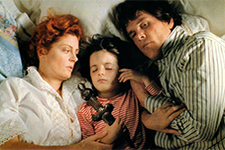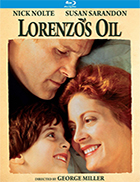Lorenzo's Oil
|  If you were any kind of regular television viewer in the 1970s and ’80s, then you are probably familiar with the “Disease of the Week” subgenre of made-for-television movies, a network favorite of that era. These movies, which shamelessly tugged at the viewer’s heartstrings with uplifting tales of ordinary people struggling against the odds to deal with a loved one’s horrible illness, were so common that the term used to describe them turned into derisive critical shorthand for shallow sensationalism and cheap sentimentality. Thus, any movie that potentially falls into that category automatically has an uphill climb to convince the viewer that it is something more. One such film is Lorenzo’s Oil, George Miller’s harrowing dramatization of the real-life struggle of a mother and father in the mid-1980s to find a cure for their son, who is afflicted with adrenoleukodystrophy (ALD), an incredibly rare and only recently identified genetic disorder in which the body cannot metabolize long-chain fats, which then collect in various tissues and lead to the steady and irreversible disintegration of the myelin sheaths in the brain, which can only result in death. The parents, Augusto and Michaela Odone (Nick Nolte and Susan Sarandon), are steadfast in their refusal to give up when their son, Lorenzo (Zack O’Malley Greenburg), is diagnosed at age 6 with ALD after demonstrating strange behaviors. All the doctors assure them that research is being done, but science is a long, slow march of clinical trials and peer review that is measured in years, if not decades. The Odones know that Lorenzo has only a few years left to live at most, as most children with ALD are dead within 24 months of diagnosis. The clock, as it were, has already been ticking, which is why the Odones refuse to accept the gentle assurances from well-meaning medical professionals that they are doing everything they can. Instead, they decide to become experts themselves, diving headfirst into the literature and researching everything they can to find the cure that had so far eluded medical researchers. They find an ally of sorts in Professor Nikolais (Peter Ustinov), a medical researcher who specializes in ALD. He is sympathetic to their plight and wants to help, but he is also bound by professional codes and the stringent parameters of scientific research. As he puts it, his responsibility is not just to Lorenzo, but to all the future children who will be diagnosed with ALD, while the Odones are focused only on their son, whose suffering as a result of his cognitive degeneration is severe. They have help from Michaela’s sister, Deirdre (Kathleen Wilhoite), as well as a series of nurses who start off well, but typically burn out under the demands of a mother who refuses to let her son’s humanity degenerate along with his myelin. Sarandon’s performance is particularly tricky in this regard, as she must play a woman who is, in some sense, unreasonable in her demands, yet is entirely understandable and sympathetic and, well, reasonable. Her anger, her frustration, her refusal to give in even if it destroys her relationships with everyone around her, drive her in a way that most of us can’t comprehend, but is ultimately admirable. Nolte has a slightly easier role in that Augusto is the more level-headed of the couple, but he is not without his limits and becomes obsessed with conducting research. Lorenzo’s Oil marked a significant departure for director George Miller, a figure of the Australian New Wave who, up to that point, was known primarily for the three postapocalyptic Mad Max films (1979, 1982, 1985) and the fantastical black comedy The Witches of Eastwick (1987) starring Jack Nicholson, Cher, Michelle Pfeiffer, and Susan Sarandon (it was, according to Miller, a miserable first-time Hollywood experience). Miller, who cowrote the script with Australian playwright Nick Enright, attended medical school and even worked as a doctor in a major hospital for several years before turning his attention full-time to cinema, so his understanding of the medical establishment and its limitation derives from personal experience. He clearly felt a passionate connection with the Odones’s story, and it comes through in every frame. Even though there are unmistakable elements of convention in Lorenzo’s Oil (it hits virtually all of the disease-of-the-week characteristics), Miller imbues the film with such emotional intensity and conviction in the heroic determination of his loner-hero protagonists that you can’t help but get caught up in their plight, cheering them on through every obstacle even as we recognize that whatever victory they may attain can only be partial.
Copyright © 2019 James Kendrick Thoughts? E-mail James Kendrick All images copyright © Kino Lorber / Universal Pictures | |||||||||||||||||||||||||||||
Overall Rating: 


 (3.5)
(3.5)


